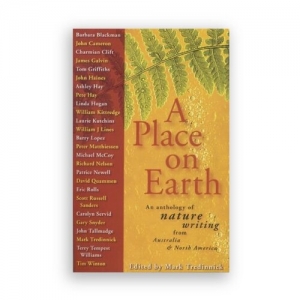Kim Mahood
Later, Katherine seemed to remember a run of light around the box, the way desert air shimmers on the horizon. What she did remember clearly were the two women walking, flat-footed and rolling-hipped, dark limbs like animated hieroglyphs inscribing the space through which they moved, an inflated plastic bag capering at their heels like a family pet. It was one ...
Kim Mahood reviews 'Desert Channels: The Impulse to Conserve' edited by Libby Robin, Chris Dickman, and Mandy Martin
In recent months a significant part of Australia has been subject to deluge and flood. As the continent recharges its waterways and water tables, we are like an ant nest into which a curious child has thrust a hose – rushing about rescuing and shoring up, patching and rebuilding, behaving as if this upheaval is an aberration, and as if building towns and cities on flood plains is sensible.
... (read more)When the Picador Nature Reader was published several years ago, it included only one contribution by an Australian: an excerpt from David Malouf’s An Imaginary Life. It’s a beautiful piece of writing, but it is not set in Australia. It struck me at the time that for a culture so deeply embedded in, and concerned with, the land we have little in the way of nature writing.
... (read more)Sunday morning at Balgo in the Kimberley, the wind ripping past in a cold gale of dust and smoke. Wirrimanu, the name of this place, means ‘dirty wind’. White plastic shopping bags pulse and inflate, struggling against the twigs and wire that restrain them. My view down the magnificent plunge of the pound is intercepted by the gridded weld-mesh cage enclosing the verandah, and again by the three-metre-high cyclone mesh fence surrounding the compound. An insufficient barrier, as it turns out, to the entry of determined petrol sniffers. They have been in during the night and have opened all the jerry cans in the back of my car. Slippers, the dog who sleeps in the tray, has clearly made them welcome. I am carrying only diesel and water, and the sniffers have taken nothing, leaving a small stone on the lid of the toolbox as a gesture of – what? – irony, defiance, humour?
... (read more)‘We had always been close’ is the first sentence of Kim Mahood’s beautifully crafted memoir. She is speaking of her father who was killed in a helicopter crash while mustering cattle on his remote Queensland property. Craft for a Dry Lake is about the journey she made through the outback country of her childhood following his death.
... (read more)


